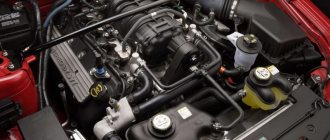As the name suggests, diesel fuel is used in diesel engines. It is produced by direct distillation of oil from kerosene-gas oil fractions of gas condensate fields. People call this fuel “diesel oil” or “diesel fuel”. Let's find out how diesel differs from gasoline, which fuel is better, and why winter diesel fuel does not freeze?
What is the difference between 92, 95, 98 gasoline and diesel fuel...
I decided to write a note so as not to forget.
I recently watched a rather interesting video about the differences in gasoline brands and the variety of diesel fuel. The video is long and not everyone has the patience to watch it to the end, in fact, what I learned for myself in a nutshell for dummies:
1. Octane number is a thing for a reason. The higher the octane number, the fewer carbon molecules in the fuel. What does this mean? The fact that the less of this same carbon, the faster the same portion of fuel supplied to the cylinders burns. So what do you say? So this is precisely what fundamentally affects the operation of the engine, detonation processes and operating speeds (from idle to cutoff).
2. Modern cars have a lot of electronics, including adjustment of the ignition timing. This suggests that, in essence, a modern car doesn’t care what you put into it. It will start and drive. How far? Judge for yourself: when the fuel burns quickly and in maximum quantities (it very rarely manages to burn out completely), then at high speeds the cylinders retain good “purge” and the car confidently shows power, rotating far beyond 6000 rpm. At the same time, in quiet mode, burning to the maximum, high-octane fuel minimizes deposits of combustion products on the cylinder walls. In addition, it mutually minimizes the need for afterburning of fuel residues with a catalyst.
3. On low-octane gasoline (everyone’s favorite 92 and its imitations), the carbon content is so high that the fuel burns rather poorly and takes a long time. What does this mean? Very rapid deposition of combustion products along the entire path of the mixture, including candles. The catalyst also chugs furiously, burning off the remains of unburnt gasoline. Moreover, due to late and prolonged ignition, the engine is fairly susceptible to detonation processes... Result: frequent replacement of spark plugs, excessive fuel consumption after the first 50-60 thousand mileage (meaning new cars), possible microcracks, incorrect operation of the gas distribution mechanism (pay attention to frequent, the check engine lights up temporarily after refueling with 92 fuel), carbon deposits everywhere, especially on the spark plugs and valves, replacing the catalyst after 35-40 thousand mileage (and this, as you know, is not a cheap pleasure), the first capital after a mileage of about 100,000 km.
4. What does DT have to do with it? This is the same product of oil condensation, only with a very high carbon content. It also has many varieties depending on the scope of application. Ship and locomotive diesel engines need the fuel to burn for a long time and the speed to be maintained at a consistently low level. Agricultural machinery uses diesel engines of a higher class, and as a result, the tractor engine speed confidently rises to 2500 per minute. Modern car engines need a completely different diesel fuel, with an even lower carbon content. Consequently, the revolutions of a modern diesel engine easily reach 5500 - 6000. Those who like to buy diesel engines at factories and ports (especially in the late 90s) probably noticed that the engine on such diesel fuel is very difficult to reach even 3500 revolutions. And major repairs were required very often... I hope now it’s clear why. The operating principles of a diesel engine and a gasoline engine are of course different, but oil burns according to the same laws of physics in both cases.
Source
Comparison of gasoline and diesel engines in passenger cars
Heavy engines are rarely installed in passenger cars. This is due to the fact that the benefits of saving fuel on small cars do not compensate for expensive maintenance and problems with finding original spare parts.
Skoda Octavia
The Czech subcompact Skoda Octavia is sold with various engine and drive options. Depending on the year of manufacture, type of fuel and configuration, the machine’s power ranges from 80 to 230 hp.
| Comparison criterion | Dis. | Benz. |
| Engine volume, l | 2 | 1,4 |
| Acceleration to 100 km, seconds | 8,7-12,9 | 6,8-14,3 |
| Torque, N*m | 250-320 | 155-350 |
| Fuel consumption, l | 4,3-6,4 | 4,7-6,4 |
| Price | From 960 thousand rubles. | From 860 thousand rubles. |
| Maintenance costs per 100 thousand km (frequency - once every 15 thousand km) | From 50 thousand rubles. | From 45 thousand rubles. |
Savings per 100 thousand km will be no more than 10-20 thousand rubles.
Citroen C4
The Citroen passenger car model is equipped with engines of the same volume.
| Comparison parameter | Dis. | Benz. |
| Engine volume, l | 1,6 | |
| Maximum speed | 187 km/h | 188 km/h |
| Torque, N*m | 270 | 150 |
| Certified fuel consumption, l | 4,8 | 6,6 |
| Cost, rub. | From 1 million | From 900 thousand |
| Maintenance costs per 100 thousand km | From 171 thousand rubles. | |
For 100 thousand km, the owner will be able to save more than 83 thousand rubles on fuel.
Which is better, gasoline or diesel?
For many decades, there has been a “war” between gasoline and diesel engines, the existence of which makes no sense to dispute. Today, many automakers supply the same models with both gasoline and diesel power plants, so it is impossible to say that one or another type of engine is preferable. But we will still try to find out everything about the advantages and disadvantages of gasoline and diesel, so that you make the right choice in the future. There are often topics on auto forums where motorists write about using gasoline for diesel engines and vice versa. Let us immediately hasten to warn you that using fuel of a type not intended for the engine is complete nonsense and the first decisive step towards the death of the engine of your “steel horse”. It's all about the fundamental difference between diesel and gasoline engines, which differ in the way the working mixture is ignited in the cylinders. What are these principles?
How does a gasoline engine “live”? The fuel-air mixture in such a power plant is formed outside the cylinder, namely in the intake manifold (this, of course, does not take into account the possibility of direct injection). The final mixing of gasoline vapor and air occurs at the end of the compression stroke. Then a fuel mixture is formed in the combustion chamber of the engine, called homogeneous and distributed evenly throughout the volume. Compression leads to an increase in the temperature of the mixture, which heats up to 500 ° C, which is significantly lower than the temperature required to ignite gasoline. After this comes the turn of the spark plugs, which give a spark and ignite the mixture. As you can see, everything is quite simple if you get into it. For those who have not thought about this, the meaning of the definition “internal combustion engine” immediately becomes clear. Diesel units are also called internal combustion engines, but their operating principle is fundamentally different from gasoline units. All the disadvantages of gasoline engines are offset by the operating principle of diesel engines. Judge for yourself. In the cylinder of such an engine, only air is compressed, which is subjected to a pressure of 30-50 bar. As a result of compression, the air heats up to 900°C. In this case, diesel fuel is sprayed into the combustion chamber before the top dead center of the piston. Fine droplets of diesel fuel evaporate and an air-fuel mixture is formed. By the way, the formation of a mixture in a diesel engine occurs an order of magnitude faster than in a gasoline engine. That is why the result is a heterogeneous or, as it is also called, a heterogeneous mixture, which self-ignites and burns well. So, we have figured out the operating principles of different types of engines. Now is the time to move directly to their disadvantages and advantages, which cannot be stated unambiguously, because in certain situations any minus of the engine can turn into a plus, and vice versa. In Russia, gasoline engines are more popular than diesel engines, and this can be explained quite simply. The reason lies in our minds and the stereotypes that are stuck in it like splinters. We are accustomed to the fact that in the Soviet era, diesel power plants were installed on heavy agricultural equipment, such as KAMAZ trucks and Belarus tractors. But few people know that passenger cars, which were mostly exported, were also equipped with diesel engines.
Statistics show the popularity of diesel engines. Thus, in France, every third car is “powered” by diesel fuel, and in Austria, about 50% of cars are equipped with diesel engines. Perhaps the Europeans know something they forgot to tell us? Let's figure it out. Engine efficiency and power It is generally accepted that the diesel engine wins in terms of efficiency. In fact, they used to think so because diesel fuel was much cheaper, but today the difference in price between gasoline and diesel has practically been leveled out. However, diesel engines still remain less voracious. This is achieved thanks to a high compression ratio (20 units for diesel, 10 units for gasoline), which allows it to surpass the efficiency of a gasoline unit by about 40%, which, naturally, is a fairly serious claim to victory. In other words, combustion of the working mixture in a diesel engine is more efficient. Owners of cars with diesel engines know that their fuel consumption will be 20% less than that of their fellows who sacrifice to the gasoline god. However, this in no way detracts from the advantages of “lighters”, which can also be quite economical. At the same time, gasoline engines have more power. For example, a Mercedes-Benz in the W124 body of the diesel version of the E 200 D model hides only 75 “horses” under the hood, while the gasoline analogue of the “Merce” has a herd of 136 “horses”. However, there is also a nuance here: the relatively small diesel power is more than compensated by smooth traction at absolutely any speed, which gasoline power plants can only dream of.
Noise characteristics It is obvious that diesel engines create more noise and more vibrations. Here's a plus that suddenly became a minus. It's all about high pressure during fuel combustion. However, here you don’t need to blame the engine, but pay attention to the sound insulation: if it is good, you are unlikely to be able to tell by ear which engine is installed while sitting in the car. Also, a lot depends on how you feel about this or that shortcoming of the car. Some scientists claim that the rumbling sound of a diesel engine at idle is very similar in frequency to a cat's purring. And, as you know, this sound calms a person and even has healing properties.
Exhaust gases The popularity of diesel engines in Europe is explained primarily by the fact that they are more environmentally friendly. In the past, riding in the tail of a diesel car promised unpleasant odors and clouds of acrid black smoke. Modern diesel units comply with Euro-4 standards, and the unpleasant smell is all a matter of taste. Many people don't like the smell of gasoline, and many don't mind the sweetish aroma of diesel fuel. Operational issues Gasoline engines are less durable than diesel engines. This is due to the more rigid and durable design of the cylinder block, parts of the cylinder-piston group, crankshaft and cylinder head. In addition, diesel fuel also contributes to longer engine operation, because this type of fuel also plays the role of a lubricant to a certain extent. But all of the above is just a theory, because the quality of diesel fuel at Russian gas stations leaves much to be desired. Here we must pay tribute to gasoline engines, which are more resistant to low-quality fuel. In addition, diesel engines are very sensitive to low temperatures. Or rather, diesel fuel does not like it when the thermometers fall below the baseboard. But this can be solved with the help of special types of fuel, as well as with the help of modern heating systems.
The low frost resistance of diesel engines is compensated by the fact that such engines are not afraid of water at all. After all, electricity is only needed to start a diesel engine, then it works without the use of electrical circuits. This is why diesel engines are often installed on SUVs and tanks, which, as you know, are not afraid of dirt. Maintenance problems Probably the issue of engine maintenance is the most important in this whole internal combustion story. The low quality of Russian diesel fuel, which we discussed above, leads to the fact that owners of diesel cars have to change oils and filters relatively often, as well as regularly carry out compression checks in the cylinders.
If we talk about repairs, then service stations less often undertake to restore diesel engines due to their complex design. In addition, repairing a diesel engine is usually more expensive, especially when it comes to a high-pressure fuel pump (a new injection pump costs the same as a used foreign car).
But the resource of the diesel power plant does not leave the slightest chance for its gasoline competitor. That is why MAZs and KAMAZs from the past still roam Russian roads, sometimes driving up to 3 million kilometers.
Now let's look at the benefits of each of our contenders.
Advantages of gasoline engines
Advantages of diesel engines
low vibration and noise levels
relatively high power
relatively low cost of diesel fuel
can operate at high speeds without negative consequences for the engine
decent pulling force at low revs
copes well with low-quality fuel
Source
Operation in winter
This point is definitely worth considering before buying a car. Remember how much time drivers have to spend warming up their vehicle. Here gasoline engines have an advantage. The problem is that diesel fuel turns into jelly at temperatures below -15 degrees Celsius. Starting the car in this case is extremely difficult.
There are several ways out of this situation: buy special winter fuel or install a heating system, which will result in additional expenses for the car owner. With gasoline units everything is much simpler, since the fuel in the tank does not freeze even at -25 degrees.
How does diesel fuel differ from gasoline: the issue of interchangeability and benefits for the driver
Although the production of electric vehicles is gaining momentum, gasoline and diesel cars are still in great demand. Accordingly, when you plan to buy a car, you need to understand which engine to give preference to. After all, everything else about the cars is almost the same: a comfortable interior, a modern beautiful body, and so on.
In this article we will try to help you make a choice by touching on the topic: how does diesel differ from gasoline. And why can you sometimes hear the name “diesel oil”. Let's talk about the difference between engines designed for different fuels. Let's start by defining the types of fuel.
Gasolines contain no more than 12 carbon atoms. This makes the fuel easily evaporate.
Diesels are petroleum products that have from 12 to 36 carbon atoms. This makes the fuel more oily.
Diesel fuel is the second, common name for diesel fuel. However, diesel cannot be called that, since diesel fuel has a different chemical composition and has an even heavier structure than diesel. Real diesel fuel is not suitable for a diesel engine.
Diesel, gasoline, and diesel fuel are produced from crude oil in accordance with GOST standards. It cannot be said that some fuel is better and some is worse. All types are suitable for engines created for them and are in massive demand.
The name "gasoline" is not Russian. The word is borrowed from the French language "benzine" and means "benzene". In turn, the word “benzene” was borrowed by the French from the Arabs and was understood as “wood incense”.
The name “diesel” comes from the name of the mechanical scientist who invented the engine. Rudolf Christian Karl Diesel created the mechanism in 1897, and in 1898 the engine was put on the assembly line. Diesel fuel has been improved for this engine.
The name “diesel oil” comes from the German word “solaröl” and means “sun oil”. It was produced much earlier than the invention of the diesel engine - in 1857.
Fuel consumption
The efficiency of diesel engines is their advantage over gasoline engines. Let's compare the nominal consumption using the example of the BMW 320 and 320d with 2.0 petrol and diesel engines with a power of 184 hp. (both with automatic transmission):
Petrol version (B48B20)
Diesel version (B47D20)
An important point: they rightly say about diesel cars that this is savings on debt. It is reasonable to use diesel in commercial vehicles; it is beneficial for frequent intercity trips. But if the car's annual mileage is less than 30 thousand km, you will not see a positive effect on your wallet.
The difference between diesel fuel, diesel and gasoline without the use of scientific justification
It is easy to distinguish between all three types of fuel, even without resorting to chemistry: gasoline is lighter than diesel, and diesel is lighter than diesel fuel. The same thing applies to the viscosity of liquids. And the smell is different, that is, the lighter it is, the lighter it is.
As we have already said, diesel fuel is in principle unsuitable for modern diesel engines. Therefore, further we will talk only about two other petroleum products.
Although gasoline and diesel are produced from crude oil, their interchangeability is excluded. Firstly, they have different chemical compositions. Secondly, gasoline and diesel will provide energy under different influences. That is, the engine design is different for each type of fuel.
The difference between a diesel engine and a gasoline engine is easy to understand, even without knowledge of physics.
Diesel ignites and provides energy the moment it combines with air. Moreover, the air must be compressed under high pressure in the cylinders.
Gasoline ignites and provides energy at the moment when a spark from the candles is directed towards it.
A diesel engine does not need spark plugs, and a gasoline engine will not start at all without them. And these are only minor differences between the two engines. In fact, a gasoline engine is significantly different in design from a diesel engine.
Noise and emissions
According to the first parameter, a gasoline engine is preferable, since its operation is characterized by low noise. The disadvantages of a diesel engine are eliminated if high-quality sound insulation is installed. The toxicity of gasoline is higher, and it contains more harmful compounds for both the environment and human health. It is also worth noting that diesel fuel evaporates less intensely, which reduces the likelihood of unexpected ignition.
Which is more profitable to drive: diesel or gasoline?
You can choose the type of fuel based on indirect and direct benefits. For example, price - the less 1 liter of fuel costs, the more profitable it is for you. And the lower the fuel consumption, the more profitable it is. A car with a diesel engine meets these conditions.
If we talk about indirect benefits, then we can reconsider the decision. For example, acceleration and speed will be better in a car with a gasoline engine. Therefore, if the issue of fuel cost is secondary for you, buy a car with a gasoline engine.
You can compare both options for repairs. The breakdowns themselves can be complex for one or the other. Although, it is with a diesel engine that the device is considered technically more complex. This means that repairs will be more labor-intensive and expensive. On the other hand, the diesel engine is more durable and durable.
Pros and cons of diesel fuel and gasoline
There are many advantages of diesel and gasoline. There are also disadvantages, but they can be easily solved by choosing the right gas station and monitoring the technical condition of the car. The only difference between gasoline and diesel fuel is temperature suitability.
On gasoline, the car will start at any minus readings. And diesel fuel must be selected according to the season: summer, winter or arctic. This is connected precisely with what we talked about at the very beginning: the amount of carbon. In diesel it is high and the liquid becomes viscous as the temperature drops.
Mixing gasoline and diesel fuel will not improve the formula created by chemists. So it’s not worth experimenting to increase power or improve the ignition of a diesel engine in the cold.
Gasoline vs diesel: the bottom line
As you can see, buying a car with a gasoline or diesel engine is a difficult dilemma. At the end of the last century, the first place could have been given to the gasoline model. After all, diesel engines polluted the atmosphere more and did not start in the cold. And a gas station with normal diesel fuel was difficult to find due to long-standing GOST standards, in which standard diesel engines were closer to diesel fuel.
Today, the gasoline engine is no longer in first place. Diesel caught up with it in all respects:
To increase speed, the technical parameters of cars have been changed;
the filtration system has been improved to reduce exhaust gases;
To operate at sub-zero temperatures, diesel fuel contains complex additives that prevent the liquid from turning into paraffin.
A car with a gasoline engine or a diesel engine - it's up to you. But keep in mind that the diesel improvements described apply to cars of the last years of production.
Source
Recommendations for selection
Comparing the cost and expenses of a car is a good opportunity to evaluate the advantages and disadvantages of engines in quantitative terms. It is recommended to choose a gasoline model in the following cases:
- for trips within city limits;
- with a small engine volume;
- for driving at high speeds.
Cars with diesel engines can withstand off-road travel better, but the owner will have to more carefully monitor the condition of the fuel filters and undergo maintenance at the frequency recommended by the manufacturer. The higher cost of the car will be paid off by fuel savings in 3-5 years.
Which car is more appropriate for you to buy - diesel or gasoline?
- The most powerful car engine
- Which engine is the most reliable?
- The best diesel engines for passenger cars
- The difference between antifreeze and antifreeze, which is better?
- Oil additives for engine restoration
Difference between Gasoline and Diesel
The main difference between Petrol and Diesel fuel is that Petrol contains lighter hydrocarbons, whereas Diesel fuel contains heavier hydrocarbons.
Have you ever walked into a gas station and wondered what the difference is between diesel and gasoline or how they are even made? Although both fuels come from the same source—crude oil—there are several key differences in the creation and use of diesel fuel and gasoline.
Oil refining
Content
What is Gasoline?
Gasoline is the most popular fuel, providing the majority of transportation needs around the world. Gasoline is a hydrocarbon derived from crude oil. In its natural state, gasoline is a liquid with a distinct odor. The chemical structure of gasoline is a mixture of alkanes and cycloalkanes with a chain length of 5 to 12 carbon atoms.
The most popular brands of motor gasoline
Gasoline is used in internal combustion engines and is classified based on octane number. Typically, the average octane level is 91 or 92.
Gas stations often offer premium fuels that have octane levels as high as 98 and even 100. Higher octane gasolines typically contain additives that act as “lubricants” to reduce engine wear.
How is Gasoline produced?
Gasoline production begins with crude oil found deep beneath the earth's surface. To find crude oil, either on land or on the ocean floor, oil companies drill wells to a depth of about 2-3 kilometers. To do this, special equipment is used to drill holes in the ground. Once discovered, the drill is removed from the ground and replaced with a pipe that extracts the oil.
Crude oil in its natural state must undergo the following processes to become gasoline used in cars and trucks:
Fractional distillation. The first step in creating gasoline from crude oil is separating large chains of molecules from small chains of molecules. This process is called fractional distillation and occurs in a fractional distillation column where oil is injected and then exposed to high temperatures (over 315°C).
During this process, the largest molecules eventually evaporate and the vapors rise to the top of the tower. Inside the tower, gasoline, natural gas and kerosene will be produced from above. Meanwhile, there will be various lubricants at the bottom of the tower.
Recycling process. The next step is called the refining process (removing unwanted impurities), which is done to create chemical changes using a catalyst, pressure and high temperatures. Catalysts used include acid, treated clay, platinum and aluminum. They all work together to break down large molecules.
Additives. Once the refining process is complete, the next step is to mix the additives to prevent the gasoline from burning too quickly and damaging the engine.
After all operations, gasoline is ready to evaluate the octane number. The higher the octane number, the higher the quality of gasoline.
What is Diesel fuel?
Diesel fuel is any liquid fuel used in diesel engines in which ignition of the fuel occurs without a spark, due to the compression of the incoming air mixture and the injection of diesel fuel. The chemical structure of diesel fuel consists of alkanes containing 12 or more carbon atoms. It takes its name in honor of Rudolf Diesel, who invented it and experimented with these engines in the late 1800s and early 1900s. Diesel fuel is a widely used source of petroleum fuel throughout the world. It is often found in boats, trains, trucks, barges, buses, fuel structures, agricultural equipment, military vehicles, some automobiles, generators for power generation, heating systems and more. There are even some remote villages/towns that use diesel to generate electricity. But if you need to create a backup power supply for your summer cottage, you can use a compact diesel generator.
Diesel generator for a summer residence
The most common type of diesel fuel is called petrodiesel, which is diesel fuel derived from petroleum. There are also several non-petroleum alternative fuels such as biodiesel, synthetic diesel and liquid biomass.
How is Diesel fuel produced?
Diesel fuel begins its cycle as crude oil, which must be collected. Once collected, it is transported to an oil refinery where it undergoes three specific processes:
Refinery
Separation. The first process is called partitioning. At this stage, the crude oil is placed in distillation columns, which have temperatures ranging from 200 to 350 °C. This heat causes the crude oil to separate into liquid and gas.
The temperature at the top of the tower is different from the temperature at the bottom, making separation possible. The top of the tower will contain propane, the middle of the tower will contain diesel fuel, and the bottom of the tower will contain all the lubricants.
Transformation. The next step in this process is called conversion, which uses a catalyst used for heavier oils. This step creates additional propane, diesel and gasoline.
Cleaning. The last stage of the process is called refining, where gasoline, diesel and propane are exposed to a catalyst and hydrogen to remove sulfur. Once the diesel fuel has passed inspections and tests, it is ready to be sent through pipelines.
What is the difference between Gasoline and Diesel
As mentioned, although both types of fuel are created from crude oil, there are many differences between them. Below is a list of some of the most noticeable differences between gasoline and diesel:
Conclusion – Gasoline vs Diesel
After distillation, there are various methods that are used to convert one fraction to another:
For example, it allows an oil refinery to convert diesel fuel into gasoline fuel, depending on the demand for gasoline. Refineries can also combine different fractions (processed, unprocessed) into mixtures to produce the desired products. For example, using mixtures with different hydrocarbon chains, gasoline with different octane numbers can be created.
The main difference between Gasoline and Diesel is that Gasoline contains lighter hydrocarbons having a chain length of 5 to 12 carbon atoms, whereas Diesel fuel contains heavier hydrocarbons containing 12 or more carbon atoms. Ultimately, diesel fuel is best suited for larger passenger cars, 4x4 trucks and SUVs, or higher consumption vehicles. Gasoline is best suited for small compact cars with lower consumption.
Source
Stages of gasoline production
Gasoline is produced by fractional distillation of crude oil. In the distillation column, the liquid is exposed to high temperatures. As a result, substances that are lighter evaporate and flow upward, from where they are pumped out through special outlet pipes. The separated fraction is treated with catalysts, acids and adsorbents, which help clean the fuel from heavy and harmful impurities.
At the last stage of production, additives are added to the finished fuel to regulate its ignition rate.
This prevents damage to the motor and accidents when working with liquid.
The quality of gasoline fuel can be determined by checking the octane number.
Filtration
Fuel filtration is very important. Every time fuel is refueled, dust can enter the neck of the fuel tank, which can cause significant damage to the rubbing surfaces of the engine and the entire power system. Dust can penetrate the engine cylinders through the injectors and clog the injector nozzle channels. This may cause the engine power to drop due to a lack of fuel in the engine combustion chamber. The structure of the filter is simple. It consists of a housing containing a filter element, usually paper, cellulose or synthetic fibers. The purpose and capabilities of filters are different. When choosing a filter, the main thing is to choose the right filter for filtration, otherwise the filter will not be useful. More universal filters are capable of filtering not only solid particles, but also water contained in the fuel
When using such filters, it is very important to monitor its condition. Filled with water, it will not leak fuel
In this case, untreated diesel fuel will bypass the filter, which will lead to improper operation of the engine and its possible breakdown. Selecting a filter is a very important and complex process. The simplest advice is to buy filters only from well-known manufacturers. Sometimes you are offered a new product. In this case, you should ask for reference documents and read them carefully. There are filters whose characteristics are simply too great. Think about it, is this really so? In addition, there are a lot of fakes of famous brands on the markets. Be careful when purchasing a filter.
How much does 1 liter of diesel fuel cost in Russia?
Price of 1 liter of diesel fuel
depends on the geographic location of the area and the current state of the fuel market. ... PRICE
| Fuel name | Density | Price per liter |
| Unleaded gasoline AI-95-K5 | 0.744 | 46.65 rub. |
| Unleaded gasoline AI-92-K5 | 0.739 | 44.34 rub. |
| Unleaded gasoline AI-100-K5 | 0.75 | RUB 53.03 |
| Kerosene RT | 0.821 | 44.17 rub. |
Interesting materials:
How to connect your phone to TV via YouTube? How to connect your phone to TV via MHL? How to connect a phone to a TV via a t2 set-top box? How to connect your phone to your TV via a digital set-top box? How to connect your phone to TV via Type-C? How to connect your phone to TV via USB to watch movies? How to connect your phone to TV via USB HDMI? How to connect your phone to your TV via USB and watch YouTube? How to connect your phone to TV via USB Samsung? How to connect your phone to TV via USB cable?











